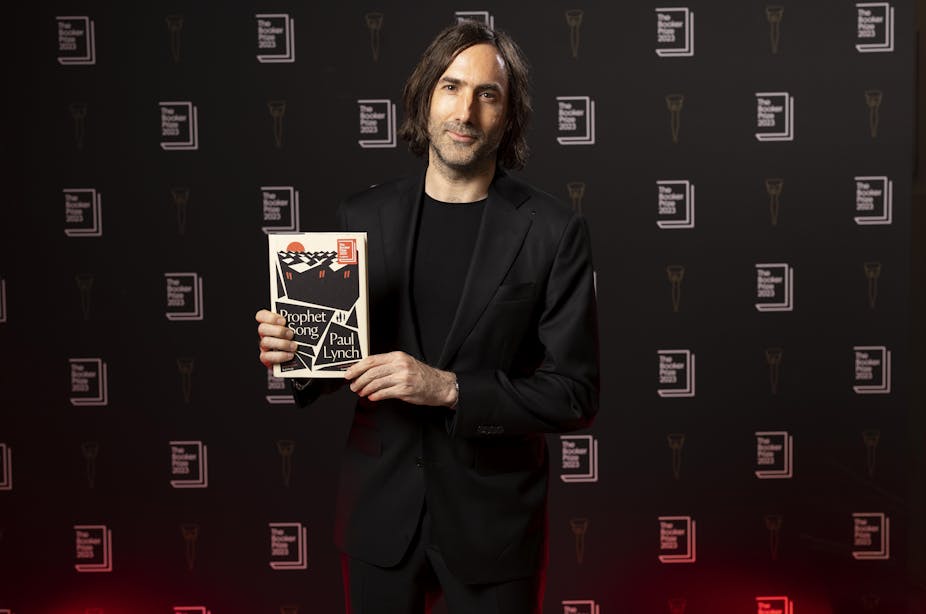The philosopher Hannah Arendt’s much-quoted description of the “banality of evil” could be applied to the disquieting story told in Prophet Song by Paul Lynch. The Booker prize-winning novel is a perfect study of the banality of totalitarianism.
It’s a rigorous imagining of how a society can be gripped by the slow-building mechanisms of an authoritarian regime – the arrests, conspiracies and disappearances – yet continue its mundane daily rituals of creche drop offs and bin collections.
In this fable of a Dublin family whose life is ruptured by the imposition of a vicious new state order and its brutal secret police, the slide from ordinary to extraordinary is captured in the smallest domestic details. A child wetting its bed in a bad dream becomes a portent of disorder, of “the world slewing into a dark and foreign sea”.
Lynch creates in the reader what his protagonist Eilish senses as the constant “night-haunted feeling” of her home city. His skill with finding omens in random images – “a lone magpie tricked into a tree” – is matched by his ability to capture the small visual tics of a disordered reality, like the graffiti that appears overnight, misspelled as “TRAITER”, on the side of the family car.
The atmosphere is unremittingly chilling, the winter light “a November smear” on the window. Even the shape of the words on the page – structured in long, paragraph-less sections – creates a kind of oppressive, monotonous tension.
Dystopian Dublin
What makes this novel so vivid for Irish readers is the transformation of the very recognisable urban landscape of Dublin into a bureaucratic, militarised dystopia. Eilish walks through the reassuring greenways of Phoenix Park and there are references to Kildare Street, Kevin Street and Stephen’s Green. But then in an almost imperceptible shift, the familiar Dublin map slips into an altered, terrible version of itself.
A sniper is posted on the tower block at Dolphin’s Barn. Helicopters swam over Kilmainham, “a plague of insects, glutted and dark”. The city is rendered uncanny, changed utterly once again.
Read more: Paul Lynch wins Booker prize 2023: why we're in a 'golden age' of Irish writing
For some readers, these visions may hint at a troubled Irish past as much as a dystopian future. The imagining of Dublin refugees escaping to freedom north across the border replays, in ironic reversal, a history of northern Catholics fleeing south in the 1970s. Many elements that feature in Lynch’s construction of an authoritarian repertoire (from internment to conspiracy, to the enforcement of emergency powers) will echo, for some, the conditions imposed during the Troubles.
Sadly too, in the wake of last week’s riots in Dublin, the novel confirms unsettling truths about the nature of right-wing terror and the speed with which liberty and democracy can be torched.
Irish speculative fiction
Comparisons will be drawn between Prophet Song and other dystopian fables, such as Nineteen Eighty-four by George Orwell or The Handmaid’s Tale by Margaret Atwood. But it also joins a distinct Irish lineage of speculative fiction.
Lynch is not the first Irish novelist to have translated his own country into the nightmarish shapes of a futurist dystopia. Back in 1990, The Bray House by Éilís ní Dhuibhne depicted Ireland in post-nuclear catastrophe, an anti-Eden buried beneath permanently damaged soil and rock.
More recently the award-winning 2011 novel City of Bohane by Kevin Barry presented a mid-21st century outpost on the west coast of Ireland blasted by ecological calamity and fast disintegrating into subhuman squalor and aggression.
The distinction of Prophet Song is the directness of its fundamental ethical question: what would you do if this happened here? It crafts an Irish tale of civic and ideological collapse that asks us to think about the many similar crises happening right now, across an unstable world.
Lynch’s novel plays on the thin boundary between counterfactual and bitter fact – it’s an uncanny allegory for what is already happening, in too many elsewheres.

Looking for something good? Cut through the noise with a carefully curated selection of the latest releases, live events and exhibitions, straight to your inbox every fortnight, on Fridays. Sign up here.

